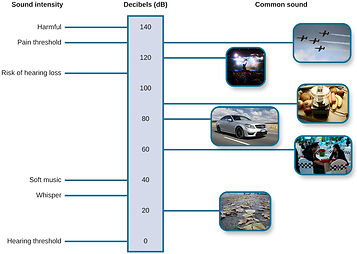
Sign Language
Sign Language

Hearing Impairment
ACCEPTED
TERMS
Firstly, to clarify: we do not refer to persons who are deaf as people who are hearing-impaired.
However, the terms ‘hard of hearing’, ‘deaf’ and ‘Deaf’ are accepted.
Do read this website to learn the different terms used to refer to persons who are deaf.
1 National Association of the Deaf (n.d.)
1
Note: This information can also be found under in our video under the Learning Resources tab!
There are four different levels of hearing loss: mild, moderate, severe or profound which can be determined by audiologists (Hearing Health Foundation, n.d.).
Hearing people are able to pick up sounds from 0dB to 110dB, up to where sounds louder than 110dB cause discomfort to hear. However, persons who are deaf have different hearing ranges, which affects how much they can hear (Informed Health, 2017).
Mild hearing loss: Persons with mild hearing loss cannot hear sounds quieter than 20 to 40dB. This may make it difficult to follow quiet conversations, which are around 40dB (Informed Health, 2017).
Moderate hearing loss: They can hear sounds louder than 41 to 60dB and hence, may not be able to converse at the normal level for conversation which is around 60dB (Informed Health, 2017).
Severe hearing loss: Sounds quieter than 61 to 80dB cannot be heard, which makes traffic (80dB) difficult or even impossible to hear (Informed Health, 2017).
Profound hearing loss: This is defined as the hearing loss of 81dB and up. Many sounds louder than 80dB are loud and intrusive for people who do not have hearing loss, and can cause discomfort or even pain if loud enough (Informed Health, 2017).
Here is a chart of some normal sounds in daily life in dB for additional reference.
LEVELS OF
HEARING LOSS

CAUSES OF
HEARING LOSS


The reasons for hearing loss can differ, especially depending on at which stage of life did one lose their hearing.
They can range from genetic causes, to aging, disease and physical trauma permanently damaging the ear (Hearing Link, n.d.).
Generally, they are grouped into 2 types (National Institute on Aging, n.d.):
Sensorineural hearing loss
Where sounds are not heard due to inner ear damage, issues with the nerves connecting your inner ear to the brain, or damage to parts of the brain related to audio processing. It is often the reason behind permanent hearing loss. Here are some possible causes:
Aging
Genetics
Brain trauma
Disease
(American Speech-Language-Hearing Association, n.d.c)
Conductive hearing loss
Where sounds are not heard due to inability to travel through the ear canal as how sounds are usually received. Some examples of conditions behind conductive hearing loss are:
Earwax
Ear infection
Physical abnormality, like a deformed ear canal
(American Speech-Language-Hearing Association, n.d.a).
In addition, hearing loss could also be a result of both types of problems:
Mixed hearing loss
Where there is both conductive and sensorineural hearing loss, meaning damage to both the outer parts of the ear and the inner ear/nerves to the brain. An example could be:
Noise-induced hearing loss and fluid in the ear
(American Speech-Language-Hearing Association, n.d.b).
